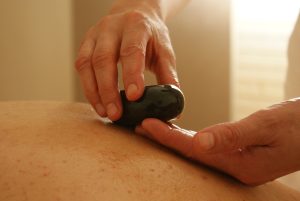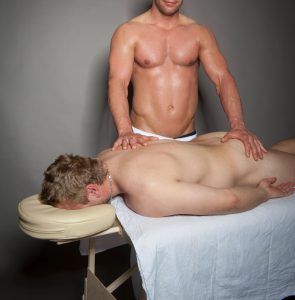Massage is an amazing way to relax, relieve stress, and improve overall well-being. Like an art, it requires skill and subtle interaction between the massage therapist and the client. The question of whether to talk during this procedure or embrace silent harmony arises for many. Each client faces a choice that can impact their personal experience and results.
In this article, we will explore the influence of conversations on the massage process and its outcomes. We will learn how communication during the session can affect the personal perception of the procedure, the effectiveness of relaxation, and possible psychological aspects. Additionally, we will present recommendations from professional massage therapists and important considerations for clients to achieve optimal results.
Impact of Conversations on the Massage Process


The influence of conversations can be quite significant, and it has both positive and negative aspects. It is important to consider that each person is unique, and their reaction to communication during massage practice may vary. Here are some key points to consider:
- Relaxation and Stress Reduction: Conversations create a more friendly and relaxing atmosphere, promoting effective relaxation of the body and mind.
- Distraction: Clients may find it challenging to completely disconnect from everyday thoughts and concerns. Conversations with the massage therapist serve as a means of distraction, allowing them to fully enjoy the process.
- Comfort and Trust: Communication with the massage therapist helps establish a relaxing connection and create a trusting atmosphere.
- Focus on the Process: For some individuals, conversations may actually distract them from the massage, hindering their complete immersion in the process. Such clients prefer to enjoy the silence to better feel the touches and reactions of their bodies to the massage.
Recommendations from Massage Therapists


Recommendations from professionals may vary depending on the type of massage and individual client characteristics. Here are some general recommendations that massage therapists may offer their clients:
- Open Dialogue: It is essential to discuss your preferences before the procedure begins. You can request the massage therapist to maintain silence during the session or allow conversations if you feel it will help you relax.
- Comfort Level: You should feel comfortable, and this includes the level of communication.
- Preferences Depending on the Type of Massage: Some massage types, such as Swedish or sports massage, may be more effective without conversations as they require concentration and deep tissue work. Others, such as relaxation massage, harmonize well with communication.
- Respect Salon Rules: Different salons have their own rules regarding conversations during the massage. Clarify this information when booking a session and follow the establishment’s guidelines.
In conclusion, the question of whether to talk during a massage does not have a definitive answer. It is an individual choice for each client, depending on their preferences, needs, and goals for the massage procedure.
Conversations during a massage can contribute to creating a comfortable atmosphere, establishing trust, and relaxing the mind. For some clients, communicating with the massage therapist can help relieve tension, enhance emotional well-being, and create a positive massage experience. Massage is a personal experience, and the best results are achieved when the client feels comfortable and satisfied with the procedure. Openness to communication, clear expression of preferences, and a trusting interaction with the massage therapist will help make the massage session enjoyable and beneficial for your body and soul.
Questions and Answers:
What approach is best to choose if I am visiting a massage salon for the first time?
If you are unsure about your preferences, try different approaches – with conversations and in silence – to determine what makes you feel more comfortable.
How do I communicate my preferences to the massage therapist regarding conversations?
Simply and honestly discuss your wishes and preferences before the massage starts to create the best experience for yourself.
Can I change my mind during the massage?
Yes, of course! Your opinion and preferences may change during the procedure, and you can always inform the massage therapist of your new preferences.
Which parts of the body can be excluded from the massage?
You can exclude any parts of the body from the massage according to your preferences. The massage therapist will take your wishes into account.
Can children receive massage?
Yes, massage is safe for children, but it should be performed by a qualified specialist and consider age-specific factors.
How can I tell if a massage therapist is qualified?
A qualified massage therapist should have appropriate education and certification. You can also read reviews and client recommendations.
Can I talk during my massage?
Yes, you can definitely talk during your massage if you feel comfortable doing so. Some people prefer silence and quiet during their massage because it helps them relax and enjoy the therapy session. However, if you want to chat or have a conversation during the massage, that’s absolutely fine as well. It’s important to communicate with your massage therapist so they can cater to your needs and provide the best massage therapy experience. Don’t be afraid to ask questions or give feedback during the session.
What if I want to talk and my massage therapist prefers silence?
If you prefer to talk during the massage but your therapist prefers quiet time, it’s totally okay. The therapist’s role is to create a relaxing and therapeutic environment, so they might encourage silence to help you unwind mentally. However, if you have any questions or need clarifications, feel free to ask your massage therapist. Their primary concern is your healthcare and making you feel calm and comfortable.
Are there any benefits to talking during a massage?
Yes, talking during a massage can have its own benefits. It can help you build a rapport with your therapist and create a sense of relief or comfort. Some people find that chatting during the massage helps them distract from any discomfort or pain, and it can also be a great way to get to know your massage therapist. However, it’s important to keep the conversation light and not to overpower the therapy itself.













![11 Best Alternatives to Bedpage: Your Ultimate Guide [March 2024]](https://massage.dating/wp-content/uploads/2024/03/Best-Alternatives-to-Bedpage-300x200.jpg)
























































































































